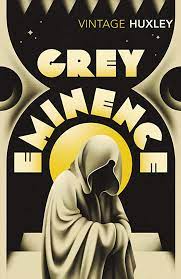Aldous Huxley, Grey Eminence (1941)
Good Reads meta-data is 297 pages rated 4.12 by 320 litizens.
Genre: Biography in fiction.
Verdict: A god botherer.
Tagline: Curses!
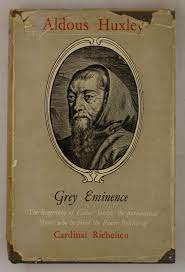
François Leclerc du Trembly (1577-1638), alias Père Joseph, was the original éminence grise to Cardinal Armand Richelieu (1585-1642), l’Éminence rouge who dominated French politics for thirty years or so. Richelieu was much in evidence with ostentatious tastes, loquacious, a know-it-all busybody, and always in red. Deep in the shadows behind him stood Joseph.
Huxley found Joseph an odd combination of a self-abnegating, pious Christian mystic and an uncompromising, unremitting bloodthirsty warlord against French Protestants, much of the French nobility, Catholic Austria, and even more Catholic Spain, and Protestants everywhere. He is presented as one of the main architects of the Thirty Years War that destroyed most of German-speaking Mitteleuropa. Every time a compromise loomed, every time the prospect of peace occurred, every time a local armistice began to spread, he opposed it. While Richelieu, ever the Sybaritic realist, was ready to accept compromise not Père Joseph and he swayed the Red Eminence to his way of thinking and acting, again and again. Murderous taxes on peasants and piles of dead bodies were his divine KPIs.
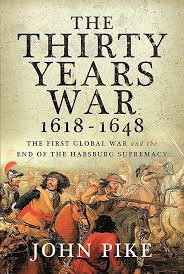
Me, I see no paradox in this combination of mass murderer and pious sky pilot. The religious are always stirring up conflict and then urging others to fight to the death for their causes, while declaiming on peace, that is, the peace of the grave. Blaise Pascal (1623-1662) put it this way: ‘Men never do evil so completely and cheerfully as when they do it in god’s name.’
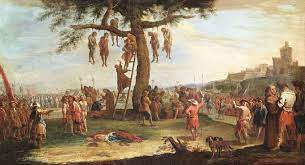
After his own extensive drug us Huxley also found the mysticism of Joseph’s Catholicism intriguing. He certainly brings that to life. The book is exceptionally well written with surgical metaphors, striking comparisons, penetrating insights into motivations, and richly detailed of the mental interior and surrounding exterior context of the time and place. The prose is sinuous and and yet almost transparent.
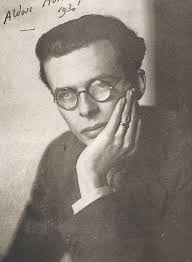
After I had encountered more than one novelist who offers a fictional biography of Niccolò Machiavelli, I wondered what Huxley, the accomplished novelist, would offer in a fictional biography, so I read it.

